In Loving Memory Of:
Jack Casey - The Sunderland Assassin
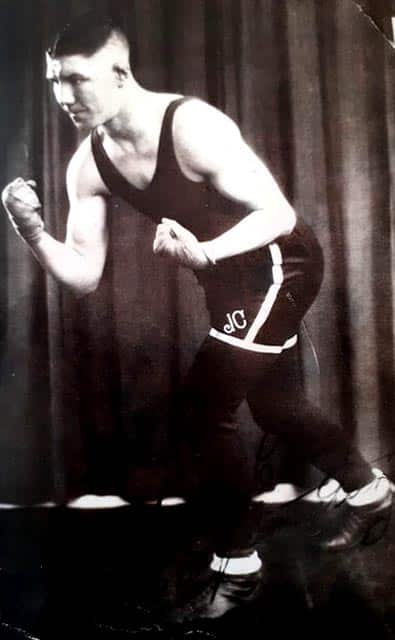
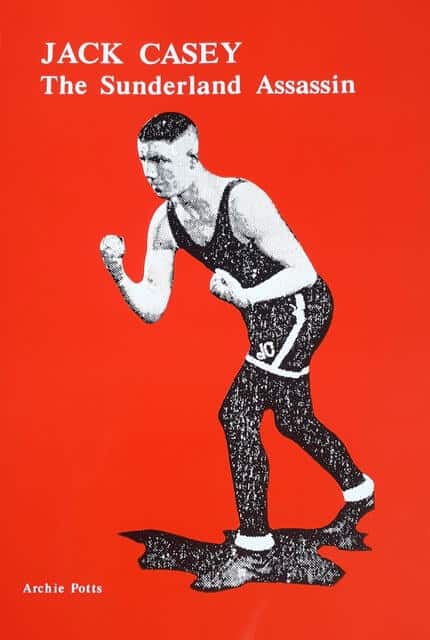
You may never have heard of my grandfather, Jack “Cast-Iron” Casey, but read any historical boxing chronicle from the 1930’s or a biography from some of the greatest fighters of that generation and you’ll hear his name quoted time and time again. Jack boasts one of the most remarkable fight records in boxing history, registered by The British Boxing Board of Control.
And whether you’re a boxing fan or not, chances are you’ll be familiar with the names of Muhammad Ali, Mike Tyson and current heavyweight champion Tyson Fury. Their victories of: 56 wins (Ali), 50 wins (Tyson) and Fury’s current tally of 34 wins respectively, prove their undeniable prowess in the ring. However, you may be surprised to learn that Jack’s fight record of 148 victories, totals more than all three of the aforementioned fighters put together!
Jack’s official fight record stands at: Total bouts: 224. Won 148, Lost 61, Drawn 15.
Amazingly, of the 61 fights lost, 52 were by points decision with the remaining 9 being stopped due to cuts, etc. Ultimately, Jack was never knocked out!
Jack Casey was born in Sunderland on 22nd September 1908 and at the time of writing (April 2024) has been deceased for almost 45 years. Yet he remains a constant subject of conversation and debate, especially in the East End of Sunderland where he resided for most of his life. And in the Welcome Tavern public house, Jack’s photos and boxing paraphernalia are prominently displayed, constituting a lasting memorial to one of Sunderland’s greatest sons.
Jack truly was a larger-than-life character, who is remembered fondly not only for his conquests in the ring but also for his generous and compassionate nature outside of it!
During the depression of the 1930s, cases of poverty and childhood deprivation were rife throughout the North East and it is a well-known, documented fact that Jack, on seeing any child in the street without shoes, would promptly seek out the child’s parents and offer money, saying “here, buy the bairn a pair of shoes”.
He also financed two boxing clubs at his gymnasium above the Golden Lion Hotel in High Street East, Sunderland. These were “The Jack Casey School of Boxing” and “Casey’s Nippers” (for boys under 10 yrs). Both clubs were managed by Jack’s father and offered aspiring youngsters the opportunity to develop their boxing skills whilst providing local promoters with fighters for their bills.
As well as the boxing clubs, Jack was a generous donor to the mayor’s “boot fund” for poor children as well as contributing to a host of good causes within the local community. He also hosted an annual Christmas party for the children of the East End which included food, entertainment and complimentary “goody-bag” to take home.
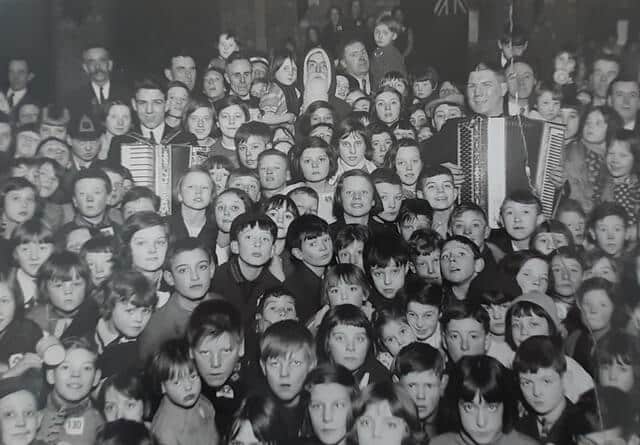
In an interview during his retirement, Jack estimated that he’d donated as much as a third of all his earnings from his boxing career to local charities and good causes.
He also admitted to a catalogue of bad career decisions which had blighted his boxing career.
To suggest that Jack’s full potential hadn’t been achieved during such a long and illustrious career may sound rather strange. After all, he fought and defeated a string of British champions including, Jack London, Reggie Meen and former British and Empire heavyweight champion Tommy Farr – considered to be one of the greatest British heavyweight fighters ever!
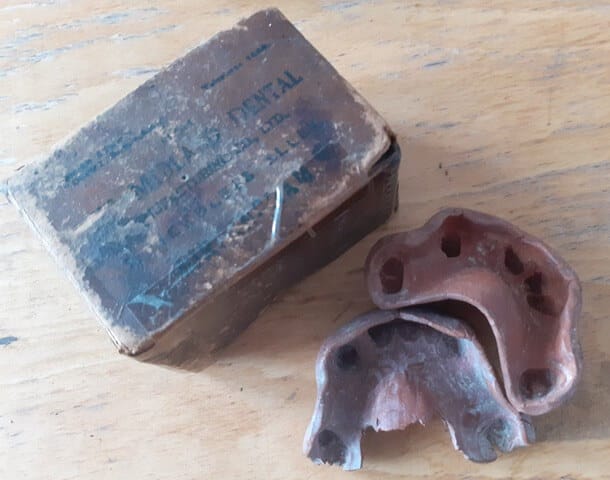
However up to 1932, Jack never had a manager, (opting to self-manage his career) meaning countless opportunities must surely have passed him by. Amongst the remnants of his personal belongings are items of correspondence from some of America’s biggest boxing promotors of-the-day, offering their services which he failed to take up.
One example of Jack’s mismanagement being when he fought French middleweight champion, Marcel Thil at the prestigious Royal Albert Hall on 9th November 1931. A catalogue of poor judgement and schoolboy errors outside the ring, surely contributed to the outcome of the fight going to the Frenchman.
Firstly, this was Jack’s first visit to the capital and instead of relaxing and mentally preparing for the fight in the comfort of his hotel, Jack chose to get-up early and go sightseeing! It was the day of the Lord Mayor’s parade and Jack was eager to see it and take in some of the sites. However, losing track of time and being unsure of his location, Jack panicked and jumped into a taxi to reach the venue for the pre-arranged afternoon weigh-in. Only to then discover he had arrived an hour or so early. However, as was customary back then, the fight officials perhaps sympathetic to Jack’s naivety, allowed him to weigh-in early and return to his hotel to rest-up ahead of the evening bout.
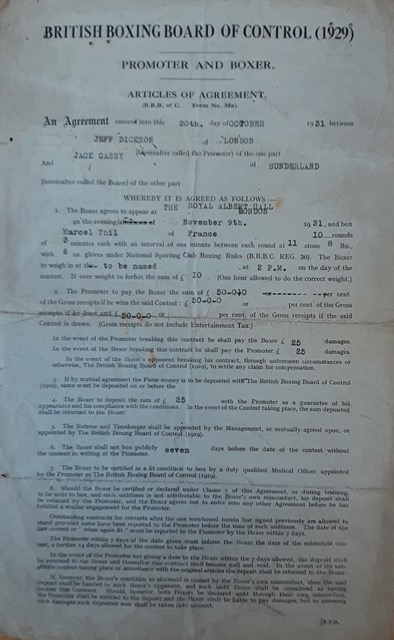
When Thil accompanied by his entourage arrived a short time later, they were shocked to discover their opponent had already completed the pre-fight formalities and left. The French contingent, taking full advantage of the situation then demanded both fighters complete the weigh-in at the same time as was stipulated in the promotor’s pre-fight itinerary or that Jack forfeit the fight and pay all remittance. The fight promotor’s hands were tied and Jack was consequently summonsed back to the venue to complete the process over again. However, in the interim period, Jack had inadvertently eaten a meal and now feared a strenuous, physical workout to meet the weight again! Luckily, he was still a pound inside the correct weight, saving him from what otherwise would’ve been a nightmare scenario. Not the greatest of preparations just hours ahead of stepping into the ring with the future world champion!
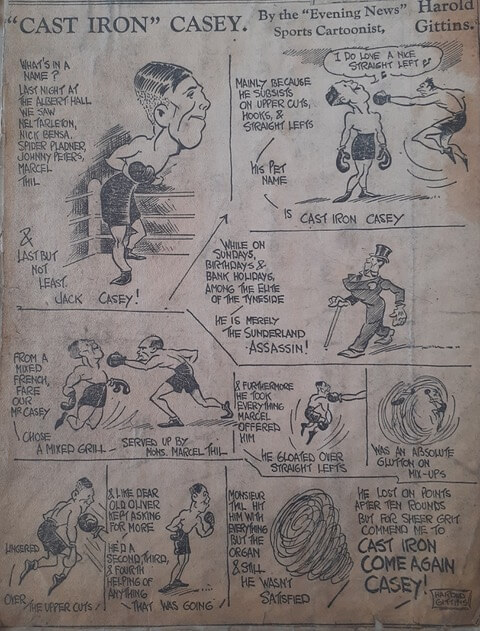
Of course, none of this may have altered the eventual outcome of the fight, but having a professional manager alongside would have ensured this farcical episode was avoided and Jack would have stepped into the ring both mentally and physically better prepared!
Thil was eventually awarded the fight on a points decision but not before he’d suffered one of the bloodiest and most brutal encounters of his career. Immediately after the fight, Thil labelled Jack the “Toughest Man in the World”; sentiments he would repeat long into his retirement. High praise indeed from a fighter who is still today, regarded as the second greatest European champion of-all-time! (second only to Joe Calzaghe).
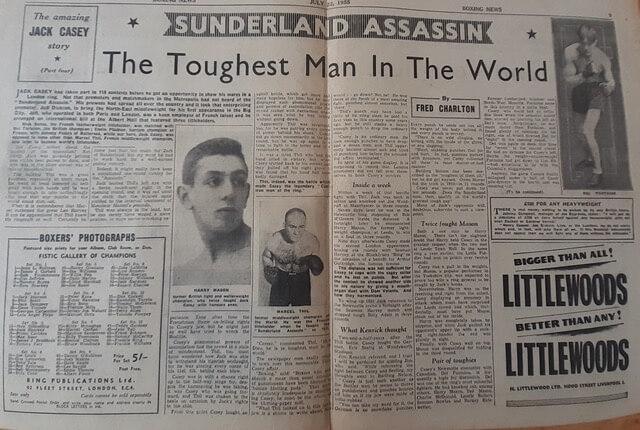
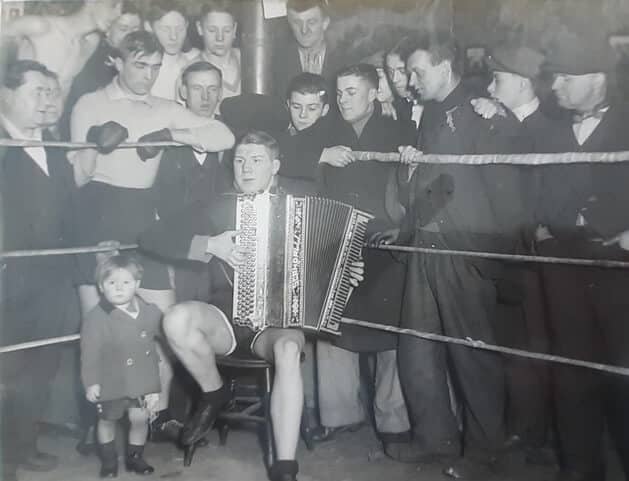
Another legendary fighter to rate Jack so highly is former British middleweight champion Len Harvey. In his biography Prince of Boxer’s, Harvey reveals his championship bout with Casey as the hardest fight of his career and also acknowledged how he came within a whisker of losing his middleweight crown to Casey. In an interview with British and Commonwealth heavyweight champion, Sir Henry Cooper some years later, Harvey explained how his right hand had never been the same since he cracked it on Casey’s jaw! He quipped “Don’t talk to me about that fellow Casey, I need my brains tested for taking him on again!”
By all accounts Jack was a quiet, private man who was devoted to his family and often shied away from media attention. When he beat Jock McAvoy on the night of 18th July, 1932 to win the Northern Area middleweight title, a reported crowd of 10,000 supporters who’d followed the fight via radio transmitter, celebrated long into the night from Sunderland Bridge and across to North Bridge Street. On learning that a brass band reception awaited him at the railway station as he travelled back from Manchester the following day, Jack hastily changed his travel plans and quietly made his way home through the back streets of the East End, where he promptly went straight to bed to catch-up on his sleep!
Away from the ring, Jack loved music and was a competent, self-taught musician playing both accordion and ukelele which he often played in the ring before a fight. He was a strong swimmer and regularly swam from Roker Pier to the old South Pier as part of his training regime. He was also known for his love of animals and bred canaries.
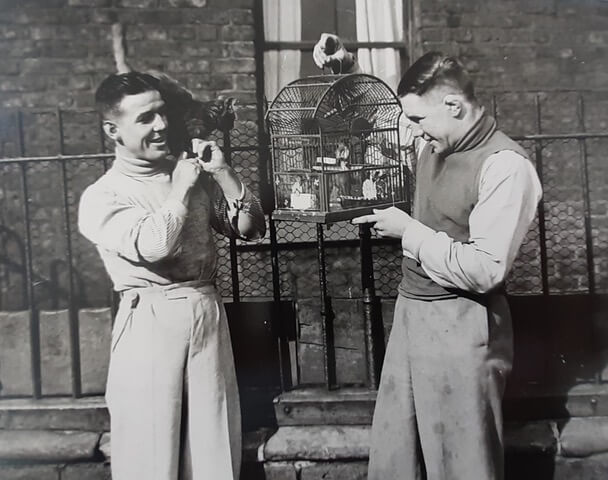
In retrospect…
From being kids, my dad would often tell us stories about our “Granda Casey” and how good a boxer he’d been in his day. He said his popularity was such that wherever he went, he was constantly surrounded by crowds of people. Even in later life, long after he’d retired from boxing, people were forever wanting to shake his hand and buy him a pint! Which is just as well, because by then his considerable earnings from the ring were long gone.
My dad always said that throughout his adult life, he’d never once seen my granda buy a drink in a pub and firmly believed he’d likely never done so for well-over thirty years! He was adamant and always said, “If he had (bought a drink), then I never saw it!”
Dad said that as kids, he and my uncle George had never wanted for anything and always had the very best that money could buy, be it clothes, toys or whatever!
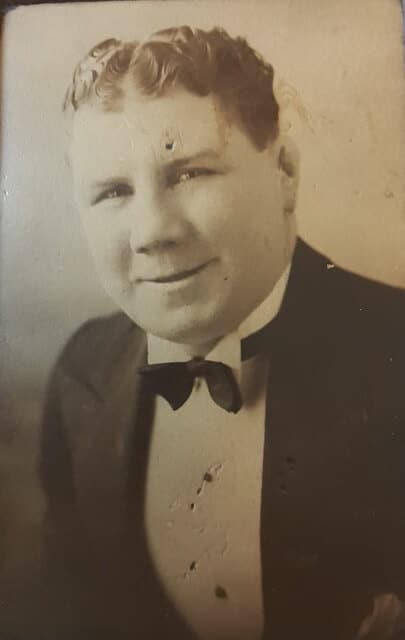
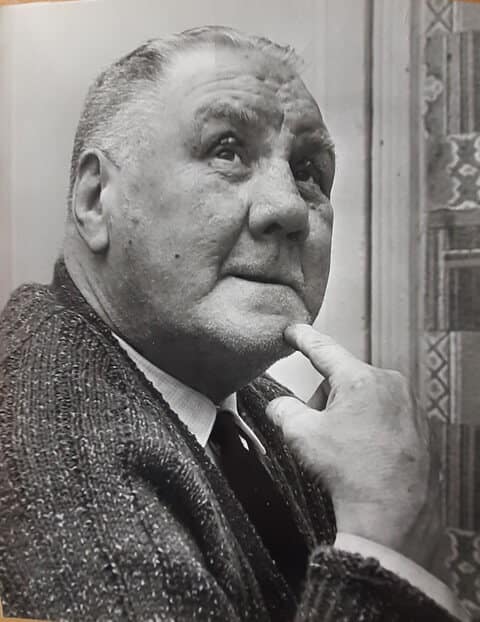
My memories of my Big-Fat Granda (as we affectionately called him) are vague but I remember him fondly as a big, gentle giant type of man with an endearing smile. By then of course he was never in the best of health. The years of punishment he’d soaked-up in the ring had taken its toll and he would often have long spells in hospital. When we visited at weekends, my dad would literally have to haul him out of bed just so we could say hello.
I often wondered how true Dad’s stories were. Then years later around 1990, my sister Linda took my granda’s old cine-reels to the Chas Eagles photo shop in town. The reels dated back to the late 1920’s and I suppose lay testament to his wealth and lifestyle back then at a time when large swathes of the North East were rooted in economic despair and hardship. Clearly, he would’ve been one of the few able to afford such a luxury at that time.
The reels were discovered in a small damp cupboard while dad and I were clearing out his cottage shortly after his death in 1980. They’d then lain discarded for another decade or so in a bin-liner at the bottom of my dad’s wardrobe!
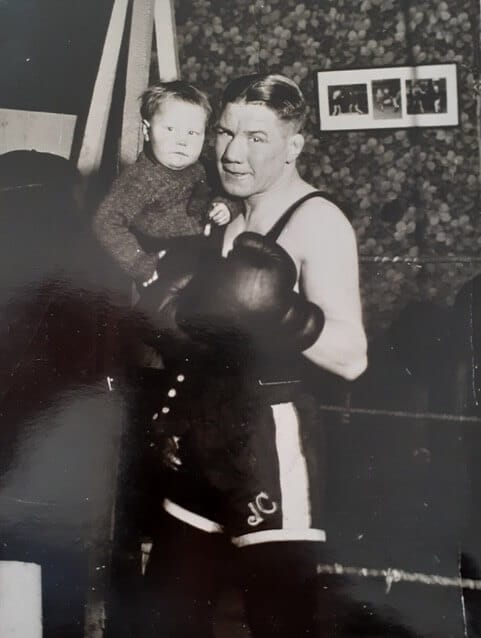
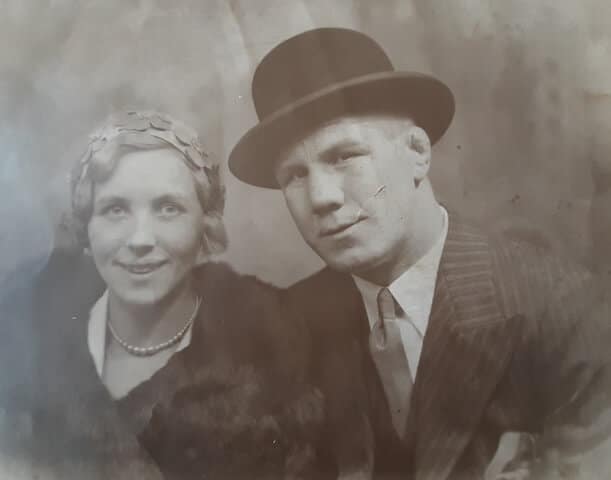
Sadly, most of the film reels had perished due to inadequate storage. However, the store manager was able to randomly splice together the remainder and transfer it onto a VHS tape. The results were astounding! It was all there in glorious black and white, just as my dad had described it over the years. There was him and our Jud (uncle George) aged around 2/3yrs old, dressed-up to the nines in their “Little Lord Fauntleroy” velvet suits, the infamous “aeroplane” pedal cars and both of them fun-fighting with my granda in their tailor-made boxing gloves.
Some of the best footage features my granda training in the Northumbrian countryside and swimming between the old north and south piers at Roker. It also contains the only known footage to exist of one of his fights. The clip, at an outdoor sports arena sees my granda knock his (unknown) opponent down and then sportingly help him to his feet again! The footage also captures my nana (Elizabeth) and granda dressed-up in their finery and looking every inch the lord & lady of the manor!
Some of my favourite footage shows my nana and granda simply relaxing with friends on Roker beach and of my granda entertaining the crowds with his ukelele in front of his name-emblazoned beach tent at Seaburn.
The ITV programme “Look North” hosted by Mike Neville produced a special two-part programme of the footage which also highlighted my granda’s life story.
The footage (much of which my granda took himself) can be found on the Sunderland Antiquarian Society website, (search: Jack Casey Home Movies) as well as other Historical websites based on the North East.
Finally… Fast-forward to April 2024
Part of my role as a Music Therapist involves delivering “singalong sessions” to care homes throughout the North East. As you’d rightly conclude, my “clientele” are elderly and for the most part, suffer some form of “memory-loss”.
Sessions begin with the usual formal introduction, (Good afternoon, my name’s John Casey from Sunderland) and I’m forever taken aback to the frequency I’m asked, “Are you any relation to Jack Casey the boxer?”
Of course, today Jack Casey is largely a forgotten figure. However, to those of a certain generation the name and legacy of Jack Cast-Iron Casey seems almost synonymous with the people and fabric of the North East.
John Casey, April 2024.
Other sources of interest:
Jack Casey “The Sunderland Assassin” by Archie Potts (Book)
Jack Casey. A recent profile compiled by boxing historian Matt Legg.

